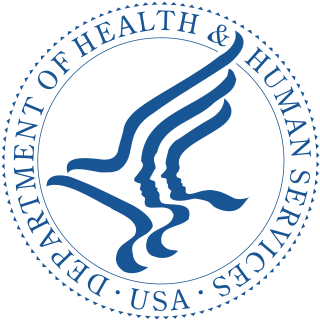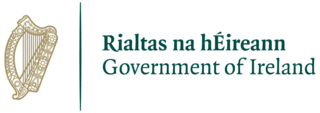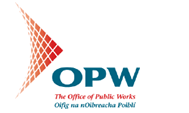
The United States Department of Health and Human Services (HHS) is a cabinet-level executive branch department of the U.S. federal government created to protect the health of the U.S. people and providing essential human services. Its motto is "Improving the health, safety, and well-being of America". Before the separate federal Department of Education was created in 1979, it was called the Department of Health, Education, and Welfare (HEW).

The Government of Ireland is the executive authority of the Republic of Ireland, headed by the Taoiseach, the head of government. The government – also known as the cabinet – is composed of ministers, each of whom must be a member of the Oireachtas, which consists of Dáil Éireann and Seanad Éireann. Most ministers have a portfolio of specific responsibilities such as departments or policy areas, although ministers without portfolio can be appointed.

The Department for Work and Pensions (DWP) is a ministerial department of the Government of the United Kingdom. It is responsible for welfare, pensions and child maintenance policy. As the UK's biggest public service department it administers the State Pension and a range of working age, disability and ill health benefits to around 20 million claimants and customers. It is the second largest governmental department in terms of employees, and the second largest in terms of expenditure.
Same-sex marriage has been legal in Ireland since 16 November 2015. A referendum on 22 May 2015 amended the Constitution of Ireland to provide that marriage is recognised irrespective of the sex of the partners. The measure was signed into law by the President of Ireland, Michael D. Higgins, as the Thirty-fourth Amendment of the Constitution of Ireland on 29 August 2015. The Marriage Act 2015, passed by the Oireachtas on 22 October 2015 and signed into law by the Presidential Commission on 29 October 2015, gave legislative effect to the amendment. Same-sex marriages in Ireland began being recognised from 16 November 2015, and the first marriage ceremonies of same-sex couples in Ireland occurred the following day. Ireland was the eighteenth country in the world and the eleventh in Europe to allow same-sex couples to marry nationwide.

The Office of Public Works (OPW) is a major Irish Government agency, which manages most of the Irish State's property portfolio, including hundreds of owned and rented Government offices and police properties, oversees National Monuments and directly manages some heritage properties, and is the lead State engineering agency, with a special focus on flood risk management. It lies within the remit of the Minister for Public Expenditure, National Development Plan Delivery and Reform, with functions largely delegated to a Minister of State at the Department of Public Expenditure, National Development Plan Delivery and Reform with special responsibility for the Office. The OPW has a central role in driving the Government's property asset management reform process, both in respect of its own portfolio and that of the wider public service. The agency was initially known as Board of Works, a title inherited from a preceding body, and this term is still sometimes encountered.
Health care in Ireland is delivered through public and private healthcare. The public health care system is governed by the Health Act 2004, which established a new body to be responsible for providing health and personal social services to everyone living in Ireland – the Health Service Executive. The new national health service came into being officially on 1 January 2005; however the new structures are currently in the process of being established as the reform programme continues. In addition to the public-sector, there is also a large private healthcare market.

Lesbian, gay, bisexual, transgender, and queer (LGBTQ) rights in the Republic of Ireland are regarded as some of the most progressive in Europe and the world. Ireland is notable for its transformation from a country holding overwhelmingly conservative attitudes toward LGBTQ issues, in part due to the opposition by the Roman Catholic Church, to one holding overwhelmingly liberal views in the space of a generation. In May 2015, Ireland became the first country to legalise same-sex marriage on a national level by popular vote. The New York Times declared that the result put Ireland at the "vanguard of social change". Since July 2015, transgender people in Ireland can self-declare their gender for the purpose of updating passports, driving licences, obtaining new birth certificates, and getting married. Both male and female expressions of homosexuality were decriminalised in 1993, and most forms of discrimination based on sexual orientation are now outlawed. Ireland also forbids incitement to hatred based on sexual orientation. Article 41 of the Constitution of Ireland explicitly protects the right to marriage irrespective of sex.

The Health Service Executive (HSE) is the publicly funded healthcare system in Ireland, responsible for the provision of health and personal social services. It came into operation on 1 January 2005.
The Irish Research Council is an associate agency of the Department of Further and Higher Education, Research, Innovation and Science, under the aegis of the Higher Education Authority. The core function of the organisation is to support research across a number of disciplines and career stages. The council also has a role in supporting research with a "societal focus", and has established partnerships across government and civic society to this end.

Michael McGrath is an Irish Fianna Fáil politician and EU Commisioner designate for Democracy, Justice and Rule of Law. He served as Minister for Finance from December 2022 to June 2024. He served as Minister for Public Expenditure and Reform from 2020 to 2022. He has been a Teachta Dála (TD) for the Cork South-Central constituency since 2007.
The Department of Children, Equality, Disability, Integration and Youth is a department of the Government of Ireland. It is led by the Minister for Children, Equality, Disability, Integration and Youth.

Paschal Donohoe is an Irish Fine Gael politician who has served as Minister for Public Expenditure, National Development Plan Delivery and Reform since December 2022 and President of the Eurogroup since July 2020. He has been a Teachta Dála (TD) for the Dublin Central constituency since 2011. He served as Minister for Finance of Ireland from 2017 to 2022, Minister for Public Expenditure and Reform from 2016 to 2020, Minister for Transport, Tourism and Sport from 2014 to 2016 and Minister of State for European Affairs from 2013 to 2014.

Simon Harris is an Irish Fine Gael politician serving as Taoiseach and leader of Fine Gael since 2024. A TD for the Wicklow constituency since 2011, he served as a minister of state from 2014 to 2016 and as a minister since 2016.
The Department of Public Expenditure, National Development Plan Delivery and Reform is a department of the Government of Ireland. It is led by the Minister for Public Expenditure, National Development Plan Delivery and Reform.
A children's ombudsman, children's commissioner, youth commissioner, child advocate, children's commission, youth ombudsman or equivalent body is a public authority in various countries charged with the protection and promotion of the rights of children and young people, either in society at large, or in specific categories such as children in contact with the care system. The agencies usually have a substantial degree of independence from the executive, the term is often used differently from the original meaning of ombudsman, it is often an umbrella term, often used as a translation convention or national human rights institutions, dealing with individual complaints, intervening with other public authorities, conducting research, and – where their mandate permits them to engage in advocacy – generally promoting children's rights in public policy, law and practice. The first children's commissioner was established in Norway in 1981. The creation of such institutions has been promoted by the United Nations Committee on the Rights of the Child, and, from 1990 onwards, by the Council of Europe.
Peter Tyndall is a former Irish public servant who served as the Ombudsman and the Information Commissioner of Ireland from 2013 to 2021.
The Ombudsman in Ireland is an officeholder and public servant whose role is to examine complaints from members of the public who believe that they have been unfairly treated by certain public service providers. The current ombudsman is Ger Deering.
St Patrick's Mother and Baby Home was an institution for unwed mothers and babies which operated for 81 years on the Navan Road in Dublin, Ireland.

Child and Family Agency v O.A. [2015] IESC 52, also known as Child and Family Agency (Tusla) v OA, is a reported Irish Supreme Court case decision. It was decided that parents should not get an order for costs in the District Court unless there are specific elements in the case at hand. The Supreme Court set up these specific points and ruled that the Circuit Court should only overturn District Court decisions if they do not follow the principles and criteria set out.

Child and Family Agency v O.A.[2015] IESC 52, also known as Child and Family Agency (Tusla) v OA, is an Irish Supreme Court case which determined the appropriateness of awarding costs in child care cases where there was an unsuccessful parental challenge to an application made by the Child and Family Agency (CFA). The Supreme Court established that there are circumstances where it might be suitable to award costs to unsuccessful parents who privately retained legal counsel; these being if the CFA "acted capriciously, arbitrarily or unreasonably in commencing or maintaining the proceedings", if "the outcome was particularly clear or compelling", or if it would be "particularly unjust towards the parents to award costs against them". It was stated that the District Court must outline its reasoning regarding a decision to award costs in such cases, holding that the Circuit Court should only reverse District Court decisions if the outlined principles and criteria are not followed.









